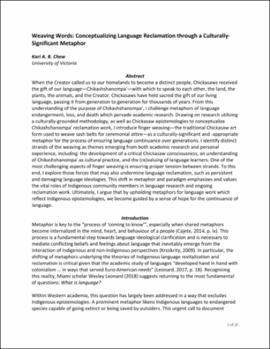| dc.contributor.author | Chew, Kari A. B. | |
| dc.date.accessioned | 2020-12-02T15:46:36Z | |
| dc.date.available | 2020-12-02T15:46:36Z | |
| dc.date.issued | 2019 | |
| dc.identifier.citation | Chew, K. A. B. (2019). Weaving words: Conceptualizing language reclamation through culturally-significant metaphor. Canadian Journal of Native Education, 41(1), 168–185. | en_US |
| dc.identifier.uri | https://hdl.handle.net/11244/326571 | |
| dc.description.abstract | When the Creator called us to our homelands to become a distinct people, Chickasaws received the gift of our language—Chikashshanompa'—with which to speak to each other, the land, the plants, the animals, and the Creator. Chickasaws have held sacred the gift of our living language, passing it from generation to generation for thousands of years. From this understanding of the purpose of Chikashshanompa', I challenge metaphors of language endangerment, loss, and death which pervade academic research. Drawing on research utilizing a culturally-grounded methodology, as well as Chickasaw epistemologies to conceptualize Chikashshanompa' reclamation work, I introduce finger weaving—the traditional Chickasaw art form used to weave sash belts for ceremonial attire—as a culturally-significant and -appropriate metaphor for the process of ensuring language continuance over generations. I identify distinct strands of the weaving as themes emerging from both academic research and personal experience, including: the development of a critical Chickasaw consciousness, an understanding of Chikashshanompa' as cultural practice, and the (re)valuing of language learners. One of the most challenging aspects of finger weaving is ensuring proper tension between strands. To this end, I explore those forces that may also undermine language reclamation, such as persistent and damaging language ideologies. This shift in metaphor and paradigm emphasizes and values the vital roles of Indigenous community members in language research and ongoing reclamation work. Ultimately, I argue that by upholding metaphors for language work which reflect Indigenous epistemologies, we become guided by a sense of hope for the continuance of language. | en_US |
| dc.description.sponsorship | A Hunt Postdoctoral Fellowship supported the preparation of this manuscript. | en |
| dc.language | en_US | en_US |
| dc.publisher | Canadian Journal of Native Education | en |
| dc.subject | Language, General. | en_US |
| dc.subject | Education, Bilingual and Multicultural. | en_US |
| dc.subject | Native American Studies. | en_US |
| dc.title | Weaving Words: Conceptualizing Language Reclamation through a Culturally-Significant Metaphor | en_US |
| dc.type | Article | en_US |
| dc.type | Postprint | |
| dc.description.peerreview | Yes | en_US |
| ou.group | Jeannine Rainbolt College of Education::Department of Educational Leadership and Policy Studies | en_US |
